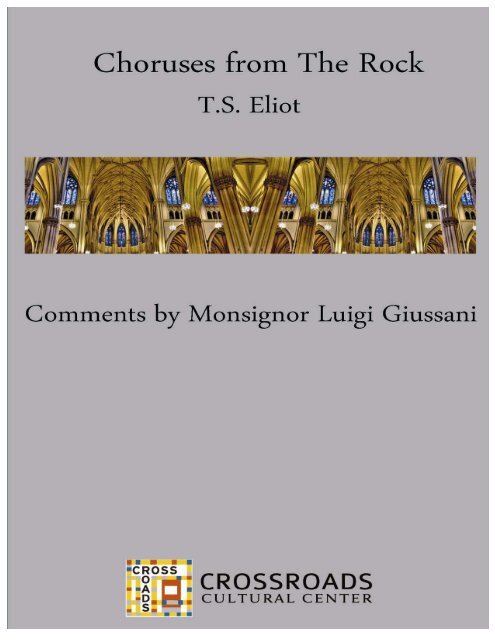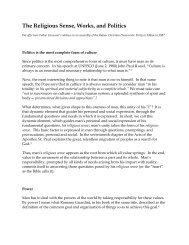T.S. Eliot's Choruses from the Rock, Comments by Luigi Giussani
T.S. Eliot's Choruses from the Rock, Comments by Luigi Giussani
T.S. Eliot's Choruses from the Rock, Comments by Luigi Giussani
Create successful ePaper yourself
Turn your PDF publications into a flip-book with our unique Google optimized e-Paper software.
“О my soul, says <strong>the</strong> poet, “be prepared for <strong>the</strong> coming of <strong>the</strong> Stranger,/Be prepared for himwho knows how to ask questions.” And anyway, <strong>the</strong> Chorus reminds men, who do not want tohear those questions, that life you may evade, but Death you shall not.” She also points <strong>the</strong> wayto <strong>the</strong> temple.“You will not deny <strong>the</strong> Stranger,” <strong>the</strong> Third Chorus concludes. It is a great responsibility and afascinating mission for our pettiness.At <strong>the</strong> beginning of Chorus V Eliot writes, “O Lord, deliver me <strong>from</strong> <strong>the</strong> man of excellentintention and impure heart: for <strong>the</strong> heart is deceitful above all things, and desperately wicked.”Excellent intentions are what we would call today common virtues; that is, <strong>the</strong> moralisticattitude. Defend me <strong>from</strong> <strong>the</strong> man that wants to save moral values but has an impure heart. Theimpure of heart is <strong>the</strong> one who does not recognize <strong>the</strong> fact <strong>from</strong> which all virtues derive….If anintellectual, for instance, has a great esteem of man, which is a created reality, a natural reality,but he doesn’t accept, does not recognize that man is a creature who has been created, that is,does not accept <strong>the</strong> objectivity of human dynamism, <strong>the</strong>n what virtue will be stressed <strong>by</strong> thisintellectual, this leader? He will stress <strong>the</strong> virtues that he cares about. If for instance he’s a manleading a government, he will stress <strong>the</strong> virtues that are useful to his government; that is, thosethat tend to maintain <strong>the</strong> status quo. On <strong>the</strong> contrary, he will try to obliterate those that bo<strong>the</strong>rhim, that create problems.A typical situation is that of <strong>the</strong> well-known Italian writer, Italo Calvino, who a few years agowrote an article in Corriere della Sera in which he magnified, he exalted <strong>the</strong> dignity of man.But where does <strong>the</strong> dignity of man come <strong>from</strong>? According to that article <strong>by</strong> Calvino, it comes<strong>from</strong> <strong>the</strong> social formation: man is conceived in function of social reality, it is social reality thatdevelops him and gives him dignity, so that we should not talk of natural rights. Abortion,<strong>the</strong>n. Nobody, in fact, has a right to life: thus abortion is allowed, if dignity is conferred to <strong>the</strong>person <strong>by</strong> society and if society decides that in its origin <strong>the</strong> person must possess a certainpsycho-physical balance, or else it is better to suppress it. Nobody has <strong>the</strong> right to say: “I amhere, you cannot touch me.” In this case Italo Calvino has had excellent intentions, those ofaffirming <strong>the</strong> dignity of man, but an impure heart because he has not recognized <strong>the</strong> fact <strong>from</strong>which <strong>the</strong> dignity of man derives.All those nowadays who affirm <strong>the</strong> so-called “moral virtues” act in this way. They haveexcellent intentions but an impure heart because <strong>the</strong> root of <strong>the</strong> common virtues, but also of <strong>the</strong>uncommon virtues, is an objective reality that does not depend on society but depends on <strong>the</strong>creatural reality that man has been made <strong>by</strong> God.Thus, “O Lord, deliver me <strong>from</strong> <strong>the</strong> man of excellent intention.” An excellent intention is thatof having a state technocratically efficient, with an adequate industrial functionality, and toaffirm <strong>the</strong> technocratic value which is a necessary factor for <strong>the</strong> increment and <strong>the</strong> power of apeople. But if in <strong>the</strong> name of all of this one has to neglect, for instance, <strong>the</strong> people who don’thave certain abilities, or <strong>the</strong> people who don’t have <strong>the</strong> possibility to defend <strong>the</strong>mselves...“Deliver me <strong>from</strong> <strong>the</strong> man of excellent intention and impure heart: for <strong>the</strong> heart is deceitfulabove all things, and desperately wicked.”8
Wicked is he who does not recognize, he who invents, who decides <strong>by</strong> himself. Protect me <strong>the</strong>n<strong>from</strong> <strong>the</strong> enemy who has something to gain and <strong>from</strong> <strong>the</strong> friend who has something to lose.That is, <strong>from</strong> <strong>the</strong> friend who, as long as I am good for him and correspond, he defends me, butwhen I don’t correspond anymore, he abandons me. Protect me <strong>from</strong> <strong>the</strong> friend who hassomething to lose.So “Those who sit in a house of which <strong>the</strong> use is forgotten” is a definition of today’sChristians, those who stay in a house whose use has been forgotten, whose origin, whosenature is forgotten. Then to <strong>the</strong>se people one can say, “Do this and that…behave this way andthat way…be careful of <strong>the</strong>se virtues,” but <strong>the</strong> origin of <strong>the</strong>ir experience and <strong>the</strong>ir dignity asChristians is not taken into consideration.Those who sit in a house of which <strong>the</strong> use is forgotten: are like snakes that lie onmouldering stairs, content in <strong>the</strong> sunlight.And <strong>the</strong> o<strong>the</strong>rs run about like dogs, full of enterprise, sniffing and barking: <strong>the</strong>y say,"This house is a nest of serpents, let us destroy it,And have done with <strong>the</strong>se abominations, <strong>the</strong> turpitudes of <strong>the</strong> Christians." And <strong>the</strong>seare not justified, nor <strong>the</strong> o<strong>the</strong>rs.[They want to destroy <strong>the</strong> house of <strong>the</strong> Christians because <strong>the</strong>y don’t correspond to <strong>the</strong>irsecular ideals. These are not justified, <strong>the</strong>se “barking dogs” around and <strong>the</strong>y say, “Let’sabolish.” “These are not justified; nei<strong>the</strong>r are <strong>the</strong> o<strong>the</strong>rs.” They are not justified, those whocry out against <strong>the</strong> Christians, but nei<strong>the</strong>r are justified <strong>the</strong> Christians who lie <strong>the</strong>re like lizards,who don’t do anything anymore because <strong>the</strong>y have forgotten <strong>the</strong> value of <strong>the</strong>ir house.]And <strong>the</strong>y write innumerable books; being too vain and distracted for silence: seekingevery one after his own elevation, and dodging his emptiness.[…]The man who has builded during <strong>the</strong> day would return to his hearth at nightfall: to beblessed with <strong>the</strong> gift of silence, and doze before he sleeps.But we are encompassed with snakes and dogs[on one side <strong>the</strong> snakes, on <strong>the</strong> o<strong>the</strong>r <strong>the</strong> dogs]:<strong>the</strong>refore some must labour, and o<strong>the</strong>rs must hold <strong>the</strong> spears.It is a time in which one cannot sleep anymore. On one side, we have snakes, lizards; on <strong>the</strong>o<strong>the</strong>r, <strong>the</strong>re are <strong>the</strong> dogs that bark. Thus one has to act. And this seems to me a beautifuldefinition of <strong>the</strong> situation in which <strong>the</strong> Church finds itself today—<strong>the</strong> Christian event today.Ano<strong>the</strong>r Chorus, number VI, refers to <strong>the</strong> destiny in time of <strong>the</strong> Christian fact.It is hard for those who have never known persecution,And who have never known a Christian,To believe <strong>the</strong>se tales of Christian persecution.It is hard for those who live near a BankTo doubt <strong>the</strong> security of <strong>the</strong>ir money.9
[Desert because <strong>the</strong>re is no man; empty because <strong>the</strong>re is no meaning, because meaning isperceived in <strong>the</strong> consciousness of man]And when <strong>the</strong>re were men, in <strong>the</strong>ir various ways, <strong>the</strong>y struggled in torment towardsGodBlindly and vainly, for man is a vain thing, and man without God is a seed upon <strong>the</strong>wind: driven this way and that, and finding no place of lodgement and germination.They followed <strong>the</strong> light and <strong>the</strong> shadow, and <strong>the</strong> light led <strong>the</strong>m forward to light and <strong>the</strong>shadow led <strong>the</strong>m to darkness,Worshipping snakes or trees, worshipping devils ra<strong>the</strong>r than nothing: crying for lifebeyond life, for ecstasy not of <strong>the</strong> flesh.Waste and void. Waste and void. And darkness on <strong>the</strong> face of <strong>the</strong> deep.And <strong>the</strong> Spirit moved upon <strong>the</strong> face of <strong>the</strong> water.And men who turned towards <strong>the</strong> light and were known of <strong>the</strong> lightInvented <strong>the</strong> Higher Religions; and <strong>the</strong> Higher Religions were goodAnd led men <strong>from</strong> light to light, to knowledge of Good and Evil.But <strong>the</strong>ir light was ever surrounded and shot with darknessAs <strong>the</strong> air of temperate seas is pierced <strong>by</strong> <strong>the</strong> still dead breath of <strong>the</strong> Arctic Current;And <strong>the</strong>y came to an end, a dead end stirred with a flicker of life.And <strong>the</strong>y came to <strong>the</strong> wi<strong>the</strong>red ancient look of a child that has died of starvation.[Rituals that had no ability to enliven <strong>the</strong> human again]Prayer wheels, worship of <strong>the</strong> dead, denial of this world, affirmation of rites withforgotten meanings[The contrary of that for which <strong>the</strong>y were born: <strong>the</strong> search for meaning]In <strong>the</strong> restless wind-whipped sand, or <strong>the</strong> hills where <strong>the</strong> wind will not let <strong>the</strong> snowrest.Waste and void. Waste and void. And darkness on <strong>the</strong> face of <strong>the</strong> deep.[The desert and <strong>the</strong> void have come back. The desert and <strong>the</strong> void have been confirmed —above, inside, below, around, all attempts of human interpretation —<strong>the</strong> major religions.]Then came, at a predetermined moment, a moment in time and of time,A moment not out of time, but in time, in what we call history: transecting, bisecting<strong>the</strong> world of time, a moment in time but not like a moment of time,A moment in time but time was made through that moment: for without <strong>the</strong> meaning<strong>the</strong>re is no time, and that moment of time gave <strong>the</strong> meaning.Then it seemed as if men must proceed <strong>from</strong> light to light, in <strong>the</strong> light of <strong>the</strong> Word,Through <strong>the</strong> Passion and Sacrifice saved in spite of <strong>the</strong>ir negative being;Bestial as always before, carnal, self-seeking as always before, selfish and purblind asever before.11
Yet always struggling, always reaffirming, always resuming <strong>the</strong>ir march on <strong>the</strong> way thatwas lit <strong>by</strong> <strong>the</strong> light;Often halting, loitering, straying, delaying, returning, yet following no o<strong>the</strong>r way.[The ascetic struggle has been introduced into <strong>the</strong> world <strong>by</strong> Christianity has come back like at<strong>the</strong> beginning]But it seems that something has happened that has never happened before: thoughwe know not just when, or why, or how, or where.Men have left God not for o<strong>the</strong>r gods, <strong>the</strong>y say, but for no god; and this has neverhappened beforeThat men both deny gods and worship gods, professing first Reason,And <strong>the</strong>n Money, and Power, and what <strong>the</strong>y call Life, or Race, or Dialectic.The Church disowned, <strong>the</strong> tower overthrown, <strong>the</strong> bells upturned, what have we to doBut stand with empty hands and palms turned upwardsIn an age which advances progressively backwards?[…]Waste and void. Waste and void. And darkness on <strong>the</strong> face of <strong>the</strong> deep.[he is back to what it was at <strong>the</strong> beginning].Has <strong>the</strong> Church failed mankind, or has mankind failed <strong>the</strong> Church?When <strong>the</strong> Church is no longer regarded, not even opposed, and men have forgottenAll gods except Usury, Lust and Power.The Christian event is an historical drama, of history, in history. The Christian event is anencounter with a physical, bodily reality of time and space that can be touched, seen,experienced, heard, which is <strong>the</strong> sign of God-made-man, in which this God-made-man ispresent. The encounter is with an integrally human reality.Only those who have <strong>the</strong> original humility – <strong>the</strong> humility that make us remaining as we havebeen created – can have and accomplish this encounter. Humility cannot but accept. Not with<strong>the</strong> qualitative leap of virtue, but with <strong>the</strong> same “quasi-mechanism” for which it exists. Thushumility is <strong>the</strong> first mark, <strong>the</strong> first imprint of God in man: <strong>the</strong> original one, <strong>the</strong> one atcreation—humility that accepts. But this encounter, that reveals man to himself, and reveals it<strong>the</strong> more you remain faithful to it, <strong>the</strong> more you walk with it, can only occur if you are humble,like John and Andrew were, like Mary was.12



